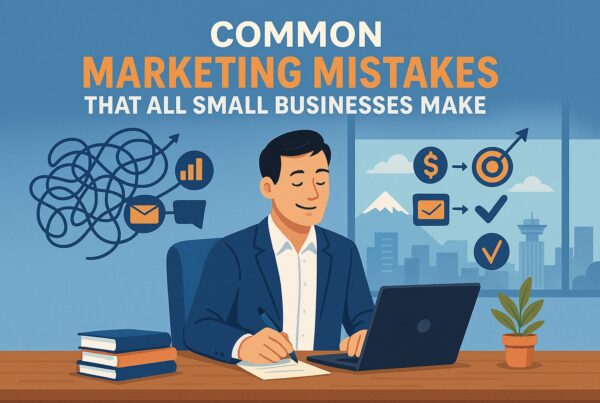The Benefits of Building a Strong Sales Foundation for Long-Term Marketing Success
Building a strong sales foundation might not be the most glamorous aspect of running a business. But for many entrepreneurs, it is critical to long-term marketing success.

In this article, we’ll examine why developing a strong sales foundation can help you drive results and explore specific benefits you can achieve by taking this approach. Whether you’re a fledgling startup or a seasoned business owner, the insights you’ll gain in this piece can help you drive smarter, more sustainable marketing campaigns.
First, let’s explore what we mean by a sales foundation. A sales foundation includes all the systems, processes, and people you need to build and manage a sales operation. This might include creating a sales plan, identifying key sales targets, creating sales materials, hiring salespeople, and more.
While this might seem like basic common sense, many entrepreneurs need to pay more attention to building a strong sales foundation when they’re starting. They might assume that sales will materialize independently or that they can create a strong marketing campaign without a sales team to back it up.
This is a dangerous approach for several reasons.
First, your marketing efforts will likely be less effective without a sales foundation. To create an effective marketing campaign, you need to understand your target audience, their pain points, their needs and wants, and so much more. A strong sales foundation emphasizes the importance of this knowledge.

In other words, your salespeople are often the most direct source of customer feedback. They’ll help you identify what works, what doesn’t and how to adjust based on feedback. Your marketing and sales efforts will likely be on target with that feedback.
Second, without a sales foundation, you’ll likely waste valuable time and resources on marketing campaigns that aren’t converting. If sales aren’t a focus when launching new campaigns, you’re less likely to get the results you desire. With a strong sales foundation in place, on the other hand, you can quickly determine which marketing initiatives are working and which are not. This saves you time and resources while helping you reach your key objectives.
Third, operating without a sales foundation can make it harder to scale your business over time. Yes, you can win some customers here and there through marketing campaigns, but you won’t be consistently winning the right customers. Implementing a specialized sales team can benefit your business in ways that a marketing campaign simply can’t. Salespeople help solidify key relationships, provide ongoing value and keep your customers returning.
With these points in mind, let’s explore the benefits of building a sales foundation for long-term marketing success in depth.
A Sales Foundation Helps You Better Understand Your Customers
One of the greatest benefits of building a sales foundation is that it allows you to build a more comprehensive understanding of your target audience. Through direct customer interactions, salespeople can help you dig deeper into customer wants, needs, and pain points, leading to a better understanding of their journey.

As a result, you can create more effective marketing campaigns that are more likely to drive conversions.
By starting with sales, your team can help you identify the types of messaging that resonate with your ideal customer base. This knowledge can help your marketing team develop targeted advertisements and messaging to promote your business’s services and products.
A Strong Sales Foundation Can Drive Consistent Lead Generation
Lead generation is a crucial aspect of any business operation. With a steady stream of leads, it can be easier to hit growth targets consistently.
A strong sales foundation can lay the groundwork for a consistent lead-generation process. This includes building a database of potential leads, developing automated outreach sequences, and creating targeted campaigns to draw in prospects.
Once you have these systems and processes in place, you can set your focus on longer-term marketing and lead-generation strategies. This can enable you to scale your operation over time, building a steady stream of leads that will help fuel your business’s continued success.
A Sales Foundation Can Help You Optimize Your Funnel
A strong sales foundation can also help you optimize your marketing funnel. You can craft customized campaigns that speak directly to key customer needs, preferences, and pain points using critical sales skills and developing a comprehensive plan for managing leads and prospects.

With a well-defined marketing funnel, you can create more targeted lead-nurturing efforts. This means customized email sequences, targeted advertising campaigns, and more. As a result, your prospects will likely enjoy higher engagement and conversion levels as they move through the sales process and become paying customers.
A Sales Foundation Enables You to Scale Your Business Over Time
Ultimately, building a strong sales foundation creates scalability for your business. Selling is a fundamental aspect of driving revenue and growth. With a top-notch sales team, you can consistently acquire new customers while nurturing existing customers for long-term growth.
The more you work to refine your sales process, the better you’ll be able.
Essential Sales Skills Every Rep Should Have
Active Listening:
Active listening means listening with intention. A sales rep with strong listening skills will fully understand a customer’s wants and needs and can tailor their sales pitch to fit those needs better.
Problem-Solving:
The ability to solve problems is a valuable sales skill because it helps sales reps understand and overcome objections. If a top sales manager or rep can solve the customer’s problem, they’ll have a higher chance of closing the deal.
Time Management:
Managing time effectively is critical in sales. Sales reps must be able to prioritize tasks, make meaningful connections with leads, and handle multiple tasks simultaneously without losing focus.
Emotional Intelligence:
A sales rep with high emotional intelligence can recognize and understand emotions in themselves and others and use that knowledge to build better rapport with their customers.
Goal Management:
Sales reps with strong goal management skills can set clear goals and develop plans. They are intrinsically motivated and understand what they need to do to succeed.
Communication:
Communication is a foundational sales skill. Effective communication helps sales reps establish rapport with customers, understand their needs and wants, and effectively sell their products or service.
Closing:
Closing a sale is a crucial and important sales skills skill that involves asking for the sale in a way that effectively closes the deal. Sales reps with strong closing skills can create a win-win for both the customer and the company.
Persistence:
Persistence is critical in the sales cycle. Sales reps must be able to deal with rejection, stay positive, and keep pushing until they close the deal.
Organization:
Organized sales reps can manage multiple tasks at once without becoming overwhelmed. Strong organization skills also help sales reps track important information about customers and leads.
Product Knowledge:
Sales reps with deep product knowledge can make sales presentations that show customers the value of the product they’re selling. They can answer questions accurately and explain how the product will solve the customer’s problem.
What are the three core skills of a salesperson?
A salesperson typically requires a variety of skills to be successful, but three core skills that are essential to becoming a successful salesperson are:
Communication:
Effective communication is crucial in sales. A salesperson must be able to articulate their value proposition and compellingly present their product or service. They must be able to listen actively to a customer’s needs and respond with customized solutions effectively. Additionally, a salesperson must be prepared to handle objections and answer customer questions confidently and succinctly.
Relationship Building:
Successful salespeople are adept at building and nurturing customer relationships. They recognize that a customer is more likely to want to buy from someone they trust and who has invested time in understanding their needs.
Problem-Solving:
Salespeople must be able to evaluate customer needs and identify their pain points. Once they have identified these, they must be able to present customized solutions that effectively address the root problems. Problem-solving requires critical thinking skills and creativity. Salespeople must also be able to handle and overcome objections effectively.
Help prospects achieve the next steps.
The role of a salesperson goes beyond just pushing a product or service onto a customer. Rather than solely focusing on closing deals, a successful salesperson’s main objective is to help prospects achieve their next steps. This means working with them to analyze their needs and providing solutions that align with their goals, challenges, and interests. By taking a customer-centric approach, salespeople can enable prospects to make informed decisions that meet their needs and desires.
By helping prospects take the next steps in their buying journey, salespeople are laying the foundation for long-term relationships and customer loyalty. When a salesperson helps a prospect understand how a particular product or service will benefit them, it can create trust and establish rapport. When sales call, prospects feel that someone genuinely cares about their needs and is willing to invest effort into helping them achieve their goals; they are more likely to feel positive about their experience and more inclined to do business with the salesperson in the future.
Moreover, helping prospects achieve the next steps goes beyond just closing deals. It can also mean guiding prospects through the education process, providing them with resources to inform their decision-making process, and connecting them with the appropriate parties to ensure their needs are met. Salespeople who assist prospects in achieving their next steps go above and beyond traditional sales practices. They are committed to providing prospective customers with the best possible customer experience and ensuring their customers’ needs are fully met. Ultimately, a salesperson committed to helping prospects accomplish their objectives is more likely to succeed in the long term.
Product Knowledge
Product knowledge is essential for a salesperson to thrive in their role. It is only possible for a salesperson to succeed in the most important sales skills with deep knowledge about the product they are selling. With comprehensive knowledge about a product or service, salespeople can interact with potential customers more confidently and communicate the benefits effectively. They can tailor the features to match the customer’s expectations and offer practical solutions for their specific needs.

While bluffing may seem like a viable way to make a few sales here and there, it is not a sustainable method and will eventually harm your career. Customers will eventually identify when you need more product knowledge to effectively sell the product, which may cause you to lose credibility. This could lead to a loss of trust, and the customer may eventually choose a competitor who has taken the time to understand their needs and has a deeper understanding of the product they are selling.
By aligning your product knowledge with the prospect’s needs, you can develop a deeper relationship with your customers, which will help you develop brand loyalty, which is also essential for long-term customer success. This means that salespeople should endeavour to learn everything about their respective products and speak to their customers in a way that resonates with their needs. Salespeople who take the time to understand their prospects’ needs and provide practical solutions that match their interests are more likely to build a loyal customer base.
In conclusion, while bluffing may work in the short term, it is essential to have robust product knowledge and align this with the prospect’s needs to succeed as a salesperson. Doing so will not only help you to build deep relationships with your customers and clients, but it will also establish you as a trusted expert in your field. By providing tailored solutions and demonstrating your expertise, you will attract new customers and retain existing ones, leading to long-term success in your sales career.
Use psychology to engage the buyer.

Psychology can be a powerful tool to engage a buyer in a sales conversation effectively. Here are four ways to use psychology to engage a buyer:
Social Proof:
Social proof is the psychological phenomenon where people look to others to determine the appropriate behaviour. To engage a buyer, you can leverage social proof by sharing testimonials, case studies, or endorsements from satisfied customers as social selling alone. When a prospect sees that others have had a positive experience with your product or service, they are more likely to consider it for themselves.
Emotional Appeal:
People make purchasing decisions based on emotions rather than logic. To leverage this, you can use emotional appeals to make your product or service resonate with the buyer. You can use language that speaks to their desires or concerns and create an emotional connection that will leave a lasting impression.
Scarcity:
Scarcity is the psychological principle that people want what they can’t have. You can use this to create urgency in the sales conversation by mentioning that your product or service is in high demand, available for a limited time, or short supply. This can create a sense of urgency that prompts the buyer to act quickly before losing the opportunity.
Consistency:
People are more likely to follow through with commitments they’ve made if they are consistent with their self-image. You can use this principle by eliciting small commitments from the buyer throughout the conversation. For example, you can ask them questions that lead them to agree that your product or service would benefit them. These small commitments build up to a larger commitment, such as purchasing.
Using psychology to engage the buyer is about creating a connection that resonates with their emotions, desires, and needs. By leveraging social proof, emotional appeal, scarcity, and consistency, you can create a compelling sales conversation that increases the buyer’s interest and willingness to take action.
Establish trust with the buyer.
It’s important to understand that using psychological principles in sales is not about manipulation or coercion. Instead, it’s about building trust and a long-term relationship with the buyer.

By using psychological techniques such as social proof, emotional appeal, scarcity, and consistency, salespeople can accurately picture the benefits offered by the product or service they are presenting to the customer. This helps the customer decide to purchase based on their positive emotions and genuine needs rather than on a manipulative push from the salesperson.
When a salesperson uses psychology correctly, it helps establish trust with the buyer. The salesperson gains credibility when logically presenting facts and personalizing the message toward the buyer’s specific needs.
Building a good relationship with the buyer based on trust will guarantee their repeat business and recommendations to other potential customers. This is the true value of using psychology in sales.
To summarize, psychology in sales is not about manipulating a customer to buy but rather creating a connection with the customer and presenting them with a genuine value proposition. When used appropriately, psychological techniques help establish trust and create a meaningful and productive long-term relationship between the salesperson and the buyer.
Negotiation Skills
The most successful salespeople are those who have mastered the art of negotiation.
At its core, negotiation is about finding a solution that works for both parties involved. This approach aligns with the win-win mentality that great salespeople should embrace.
Especially in B2B for sales organizations, negotiating effectively can make all the difference in closing a deal. The most successful salespeople understand the importance of being assertive and cooperative to reach an agreement satisfying all parties involved.

In addition, the most effective negotiators are prepared. They know their product or service inside and out, and they understand their customer’s needs and goals. Great salespeople plan and anticipate objections or counter-proposals that the buyer might make. This preparation ensures they can quickly and efficiently address concerns and develop solutions that fit both parties.
In summary, negotiation skills are essential to successful sales. Great salespeople can close more deals and establish stronger customer relationships by adopting a win-win mentality, preparing thoroughly, and finding solutions for both parties.
Prepare for objection handling.
Anticipating and handling objections is an essential part of the sales process, and a great salesperson must be fully prepared to address any objections the prospect raises.
The first step in handling objections is actively listening to the prospect’s concerns. By listening carefully, the salesperson can determine the root of the prospect’s concern and understand why they object. Once the salesperson understands the concern, they can respond confidently while addressing the underlying issue causing the objection.

Effective sales professional objection handling requires deep knowledge of the product or service being sold. A great salesperson should be prepared to answer common objections with facts, data, and tangible benefits of the product or service. They should also be able to customize their response to the individual prospect, demonstrating that their concern is being taken seriously and that a personalized solution is being offered.
Handling objections is an important skill and an opportunity to build a deeper relationship with the prospect by showing that the salesperson understands their needs and concerns. By addressing concerns and providing effective solutions, the salesperson can establish trust with the prospect and increase the likelihood of closing the deal.
In summary, handling objections is a critical component of the sales process, and a great salesperson will prepare thoroughly and respond with confidence and empathy. The salesperson can establish a stronger relationship with the prospect and increase the likelihood of closing a successful deal.
Want to know more?
Are you ready to take your sales game to the next level and enjoy long-term marketing success? Look no further than my sales training programs. With my extensive sales experience and expert knowledge, you and your team can learn the essential skills needed to build a strong sales foundation.
From effective communication to mastering the art of negotiation and objection handling, my training programs will equip you with the tools to achieve your sales goals and build lasting relationships with your customers.

Don’t wait to invest in yourself and your team. Sign up for my sales training program today and start reaping the benefits of a strong sales foundation! Contact me now to take the first step towards success!
joel@coachingsuccess.cao



